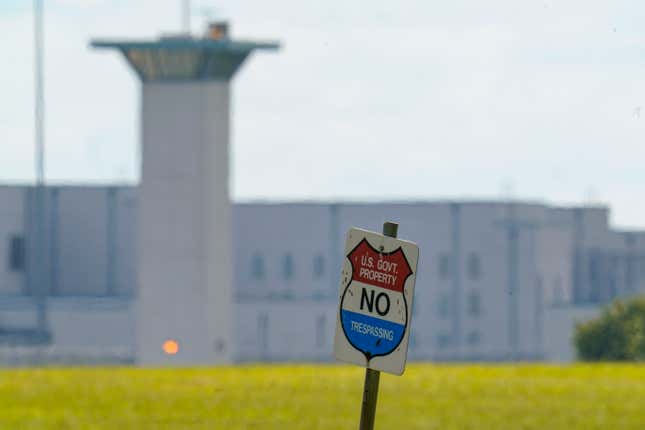
Throughout the coronavirus pandemic, the United States Congress has given only one stimulus check to help Americans weather the public health crisis and its ensuing economic downturn.
For many households, that $1,200 check has long since been spent, as months of political discussions about a second stimulus bill dead-ended with the president and Senate Majority Mitch McConnell, who prioritized pushing through Amy Coney Barrett’s confirmation to the Supreme Court. Still, a significant group of Americans have yet to see checks that they’re eligible for and would have a disproportionate impact on their wellbeing: those who are imprisoned.
It isn’t simply that the checks haven’t made their way to those currently locked away in America’s prisons. The issue of whether they should receive payments at all was only resolved recently. After months of back and forth within the IRS, which first approved then disallowed prisoners from getting stimulus checks, a federal judge ruled in late September that Americans living behind bars should get government relief too.
But according to prisoners, attorneys and their advocates, correctional facilities and the officials that run them have been blocking prisoners from accessing the funds, which have now been approved by both Congress and the Courts. With a fast-approaching deadline to register for a stimulus check, referred to in Congress as an “economic impact payment” (EIP), many of America’s imprisoned and their families risk not receiving any payments at all.
Today, U.S. Reps. Ayanna Pressley (D-Mass.) and Danny Davis (D-Ill.) wrote a letter to the Federal Bureau of Prisons demanding the department ensure all people in state custody have access to the money owed to them by the federal government.
“Whether intentional or unintended, any action to undermine, delay, or infringe upon the rights of our neighbors behind the wall will not be tolerated,” wrote the lawmakers in a letter to BOP Director Michael Carvajal. “It is critical that BOP works expeditiously to clear all barriers in the path of people seeking to receive their EIPs.”
The letter cites recent reporting about a number of disruptions nationwide that have prevented inmates from accessing their payments—or even finding out that they’re eligible.
In Kansas, more than $200,000 in stimulus payments were wrongfully seized, the letter notes. Despite the courts approving payments for the imprisoned and their families, this money has yet to find its way to them.
Attorneys based in Ohio and Vermont who had been sending weekly legal newsletters to thousands of federal prisoners for years suddenly found those newsletters bouncing back, with the BOP declaring their correspondence “detrimental to the security, good order or the discipline of the facility, or might facilitate criminal activity.” As NBC News and the Marshall Project reported, the common thread between these newsletters was that they advised prisoners on how to apply for the $1,200 stimulus checks.
In their letter to the BOP, Reps. Pressley and Davis called the department’s explanation for the blocked newsletters “fallacious and unacceptable.”
“When coupled with other reported actions, like confiscated forms delivered by mail, there is an appearance of a coordinated campaign to keep individuals in BOP custody uninformed and impoverished,” they wrote. “This injustice is unconscionable.”
Since the start of the pandemic, America’s imprisoned have been among the country’s most vulnerable populations, living in conditions that made them more susceptible to contracting and spreading COVID-19, and with limited support and resources to fight it.
Many states were forced to dramatically reduce their jail populations to help minimize the risk of detainees and correctional staff spreading the virus within jails and in their communities once they were released. But in prisons, where people are less likely to cycle in and out, populations dipped only slightly—an 8 percent drop compared to a 25 percent plunge in jail populations, writes Science Magazine.
As of Oct. 29, at least 152,955 imprisoned people have tested positive for the virus, with 1,276 reported deaths, reports the Marshall Project.
Not only are incarcerated people more likely to contract the virus than other Americans, but a stimulus payment would also have a disproportionate impact on their financial wellbeing and that of their families. Pressey and Davis’ letter cites one national study that found the median annual income of those incarcerated was just $19,185 before their imprisonment—41 percent lower than their non-incarcerated peers.
The pandemic has heightened inequality throughout the country, and the incarcerated—disproportionately Black, low-income and with mental health issues—sit at the intersection of a public health crisis and a biased justice system. Some lawmakers, like Pressley, have introduced legislation to specifically help the nation’s imprisoned, such as June’s landmark Dismantle Mass Incarceration for Public Health Act, which would require the release of eligible individuals who are currently incarcerated during the COVID-19 pandemic and for one year after. Reps. Rashida Tlaib (D-Mich.) and Barbara Lee (D-Calif.) joined her on the bill.
The congressional lawmakers called on BOP Director Carvajal to be more transparent, asking the agency to provide the guidance it has given to state, tribal and local entities regarding the distribution of stimulus checks, as well as inquiring about information accessibility—how many internet accessible computers and printers are available to inmates nationwide so they can actually fill out the forms required of them? The letter also asked the BOP explicitly why it prevented email correspondence on how to access stimulus funds from reaching those incarcerated, and who was responsible for the decision.
Inmates eligible for the checks are currently in a race against the clock. The IRS has set a Nov. 21 deadline for registering for the checks, prompting Pressley and Davis to ask for a response from the BOP by Nov. 6.